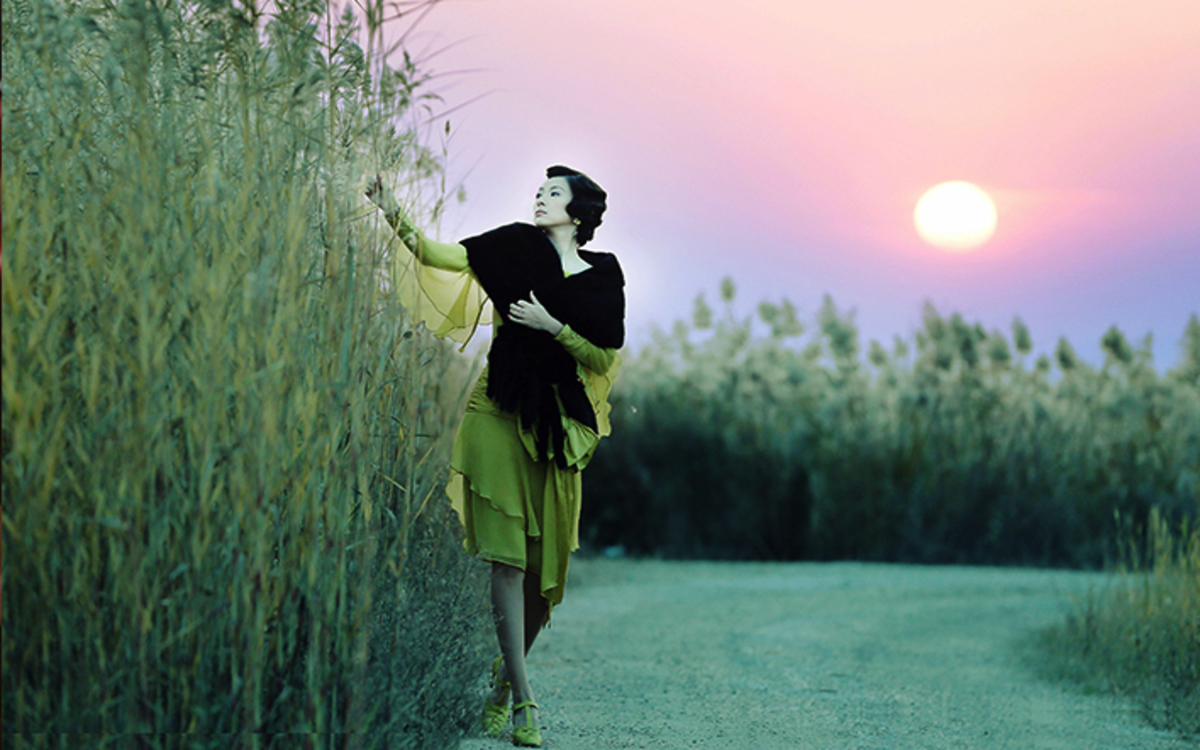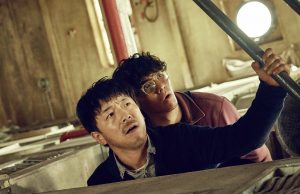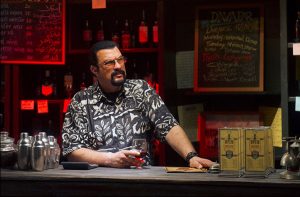Every day while CFI’s Hollywood readers take in the business of the Chinese film industry, the actual movies can sometimes seem exotic or remote. But in major US cities, mainstream Chinese films are increasingly available: thanks to Wanda’s purchase of AMC and distributors like China Lion, they get American theatrical releases practically simultaneous to their premieres at home. Though they receive virtually no publicity outside the non-Chinese community, these films are more than worth seeking out by anyone serious about engaging the Chinese industry, understanding the Chinese sensibility and familiarizing themselves with China’s talent pool. Periodically, CFI will review and point readers in the direction of noteworthy US releases of contemporary commercial and independent Chinese titles.
Vulgar, Silly, Exquisite
The Wasted Times (2016), written and directed by Cheng Er.
Distributed by China Lion, opened in the US December 16, 2016 (cinemas here).
Grade: B
Pretty people and prettier pictures are among the laudable assets in the pedigree and filigree of this gangster story set in Shanghai amid the complicated, intertwining gangland and partisan politics and allegiances of the Sino-Japanese War and World War II. Beginning in 1937, on the eve of Japan’s invasion of Shanghai, Cheng’s fractured storytelling follows a fearsome crime boss (Ge You) plotting against a friend and advisor, the Japanese brother-in-law he no longer trusts (Tadanobu Asano). “Japanese people give me a headache,” Asano protests. “I’m Shanghainese.” It’s an old-fashioned commercial picture with sumptuous production values, two of China’s biggest stars alongside one of Japan’s, and the luster of high art.
An intimate epic, the film bears down on the personal fates of Ge, Asano, and Zhang Ziyi as a high-strung, promiscuous film star who is married to Ge’s boss, while larger forces contend in the background—an approach and tone, with its stately pacing, over-lush ambience and baroque eruptions of violence and emotion, that taps a vein of Italian sensibility mined memorably in films by Visconti, Leone, and Bertolucci.
Where this pays off is in the director’s focus on the consequences of violence, the danger of relationships transacted in threats. His characters move through the film’s cities (wartime Hong Kong and Chongqing, in addition to Shanghai) and pale fields like ghosts. Depopulated sets make the events seem more dreamlike. Even in wide shots that put characters against bold architecture, there’s no bustle, just the vulgar whisper of criminal commerce.
At other moments, though, the film feels like a thwarted epic, its story incapable of filling the scale its canvas suggests, its score interspersed with kitschy neoclassical songs, its visual style coming across as merely derivative rather than inspired (Cheng’s measured pace allows the mind to start measuring, clocking shots cribbed from the Italians, Hou Hsiao-Hsien, Scorsese).
And while the design draws on bold color palettes, close-ups of strong faces like those in Zhang Yimou’s films, and the weight of interior spaces in Hou’s work, these gangsters don’t well up with world-weary melancholy like those in Hou; they kill, there’s blood, and there’s really no apologizing for their lifestyle and their death-dealing: “You should kill me with a sense of righteousness,” a woman says in deadest of deadpan. The sound design leans towards the hollow, its echo reinforcing cavernous rooms where middle-aged men play Mahjongg while deciding fates with offhand imprudence. But Cheng appreciates other textures, including the liquid sound of the back of a shovel smashing in the face a man cowering in a freshly dug grave, or, in a quieter moment, the rasp of a knife through fish as a Japanese meal is made, followed by the gentle cry of a gratified black cat getting a bite.
Non-Chinese audiences unfamiliar with the career of legendary Shanghai gangster “Big Ears” Du Yuesheng; with the ebb and flow of wartime Kuomintang/Communist détente and rivalry; or with the details of Japan’s occupation of China are going to have a hard time understanding the context for all the interpersonal drama, and Cheng’s non-linear approach makes things more perplexing.
But when the drama fails to engage, the colors, texture, and visual style make up for a lot. The level of technical skill exhibited by Cheng and his cinematographer and designers (who include Hong Kong’s Yee Chung-man, a disciple of Wong Kar-Wai’s production designer/costumer, William Chang) is some of the best China has to offer: even the play of half-light on Zhang Ziyi’s cheekbones as she rides in the backseat of a car, moving toward an unknown fate at the story’s outset, casts a spell that continues throughout the film. And it is from Zhang that most of the film’s emotional impact comes: scenes depicting her abuse at the hands of Asano, and her life as an actress prior to his abduction of her.
The mockery in her voice at a dinner party of how she performed for a director who might cast her in a melodrama of that era is the quintessence of her chatty, catty character. She auditions a goodbye scene, a tissue of salmon-to-pink fake sunset flushing her fine features. “Universal love is merely the safest and most convenient name for you to hide behind while living your lazy, selfish, and petty life. Lives are wasted because of men like you,” she enunciates with a calm both classic and modern, “What I want is a man who is capable of love and hatred.” Which leads to a scene where she sits with the director, who is dressed in an ice-cream pastel suit, fondling her crimson-painted toes, as he declares, “You are such a slut. You’ll make a big star, you are so vulgar and silly, but so exquisite in front of the camera.” At that moment, Cheng Er knows what he’s making: a movie vulgar and silly, but exquisite in front of the camera.
WHAT DOES THE GRADE MEAN?
Here are some recent & modern-era vintage Chinese and Hong Kong films for comparison
- A+
- PLATFORM (2000, dir Jia Zhangke)
- THE WORLD (2004, dir. Jia Zhangke)
- DRUNKEN MASTER 2 (1994, dir. Lau Kar Leung & Jackie Chan)
- KUNG FU HUSTLE (2004, dir. Stephen Chow)
- A
- LET THE BULLETS FLY (2010, dir Jiang Wen)
- THE MERMAID (2016, dir. Stephen Chow)
- A TOUCH OF SIN (2013, dir. Jia Zhangke)
- STILL LIFE (2006, dir. Jia Zhangke)
- MOUNTAINS MAY DEPART (2015, dir. Jia Zhangke)
- LITTLE BIG SOLDIER (2010, dir. Ding Sheng)
- EXTRAORDINARY MISSION (2017, dir. Alan Mak & Anthony Pun)
- MR SIX (2015, dir. Guan Hu)
- A WORLD WITHOUT THIEVES (2004, dir. Feng Xiaogang)
- SUZHOU RIVER (1999, dir. Lou Ye)
- HOUSE OF FLYING DAGGERS (2004, dir Zhang Yimou)
- RAISE THE RED LANTERN (1991, dir. Zhang Yimou)
- A-
- DUCKWEED (2017, dir. Han Han)
- I BELONGED TO YOU (2016, dir. Zhang Yibai)
- B+
- THE GREAT WALL (2016, dir. Zhang Yimou)
- OLD STONE (2016, dir. Johnny Ma)
- CRAZY STONE (2006, dir. Ning Hao)
- GO, LALA GO (2010, dir. Xu Jinglei)
- B
- KUNG FU YOGA (2017, dir. Stanley Tong)
- RAILROAD TIGERS (2016, dir. Ding Sheng)
- THE WASTED TIMES (2016, dir. Cheng Er)
- CHONGQING HOT POT (2016, dir. Yang Qing)
- MONSTER HUNT (2015, dir. Raman Hui)
- B-
- JOURNEY TO THE WEST: THE DEMONS STRIKE BACK (2017, dir. Tsui Hark)
- SOME LIKE IT HOT (2017, dir. Song Xiaofei & Dong Xu)
- BORN IN CHINA (2016, dir. Lu Chuan)
- D-
- TINY TIMES (2013, dir. Guo Jingming)






